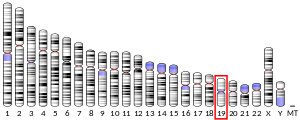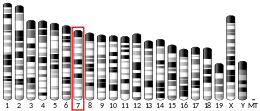GPR4
G-protein coupled receptor 4 is a protein that in humans is encoded by the GPR4 gene.[5][6]
See also
References
- 1 2 3 GRCh38: Ensembl release 89: ENSG00000177464 - Ensembl, May 2017
- 1 2 3 GRCm38: Ensembl release 89: ENSMUSG00000044317 - Ensembl, May 2017
- ↑ "Human PubMed Reference:".
- ↑ "Mouse PubMed Reference:".
- ↑ Mahadevan MS, Baird S, Bailly JE, Shutler GG, Sabourin LA, Tsilfidis C, Neville CE, Narang M, Korneluk RG (Apr 1996). "Isolation of a novel G protein-coupled receptor (GPR4) localized to chromosome 19q13.3". Genomics. 30 (1): 84–8. doi:10.1006/geno.1995.0013. PMID 8595909.
- ↑ "Entrez Gene: GPR4 G protein-coupled receptor 4".
Further reading
- An S, Tsai C, Goetzl EJ (1996). "Cloning, sequencing and tissue distribution of two related G protein-coupled receptor candidates expressed prominently in human lung tissue". FEBS Lett. 375 (1–2): 121–4. doi:10.1016/0014-5793(95)01196-L. PMID 7498459.
- Heiber M, Docherty JM, Shah G, et al. (1995). "Isolation of three novel human genes encoding G protein-coupled receptors". DNA Cell Biol. 14 (1): 25–35. doi:10.1089/dna.1995.14.25. PMID 7832990.
- Strausberg RL, Feingold EA, Grouse LH, et al. (2003). "Generation and initial analysis of more than 15,000 full-length human and mouse cDNA sequences". Proc. Natl. Acad. Sci. U.S.A. 99 (26): 16899–903. doi:10.1073/pnas.242603899. PMC 139241. PMID 12477932.
- Lum H, Qiao J, Walter RJ, et al. (2003). "Inflammatory stress increases receptor for lysophosphatidylcholine in human microvascular endothelial cells". Am. J. Physiol. Heart Circ. Physiol. 285 (4): H1786–9. doi:10.1152/ajpheart.00359.2003. PMID 12805023.
- Ludwig MG, Vanek M, Guerini D, et al. (2003). "Proton-sensing G-protein-coupled receptors". Nature. 425 (6953): 93–8. doi:10.1038/nature01905. PMID 12955148.
- Bektas M, Barak LS, Jolly PS, et al. (2003). "The G protein-coupled receptor GPR4 suppresses ERK activation in a ligand-independent manner". Biochemistry. 42 (42): 12181–91. doi:10.1021/bi035051y. PMID 14567679.
- Sin WC, Zhang Y, Zhong W, et al. (2004). "G protein-coupled receptors GPR4 and TDAG8 are oncogenic and overexpressed in human cancers". Oncogene. 23 (37): 6299–303. doi:10.1038/sj.onc.1207838. PMID 15221007.
- Gerhard DS, Wagner L, Feingold EA, et al. (2004). "The Status, Quality, and Expansion of the NIH Full-Length cDNA Project: The Mammalian Gene Collection (MGC)". Genome Res. 14 (10B): 2121–7. doi:10.1101/gr.2596504. PMC 528928. PMID 15489334.
- Kim KS, Ren J, Jiang Y, et al. (2005). "GPR4 plays a critical role in endothelial cell function and mediates the effects of sphingosylphosphorylcholine". FASEB J. 19 (7): 819–21. doi:10.1096/fj.04-2988fje. PMID 15857892.
- Qiao J, Huang F, Naikawadi RP, et al. (2006). "Lysophosphatidylcholine impairs endothelial barrier function through the G protein-coupled receptor GPR4". Am. J. Physiol. Lung Cell Mol. Physiol. 291 (1): L91–101. doi:10.1152/ajplung.00508.2005. PMID 16461426.
- Huang F, Mehta D, Predescu S, et al. (2007). "A novel lysophospholipid- and pH-sensitive receptor, GPR4, in brain endothelial cells regulates monocyte transmigration". Endothelium. 14 (1): 25–34. doi:10.1080/10623320601177288. PMID 17364894.
- Zou Y, Kim CH, Chung JH, et al. (2007). "Upregulation of endothelial adhesion molecules by lysophosphatidylcholine. Involvement of G protein-coupled receptor GPR4". FEBS J. 274 (10): 2573–84. doi:10.1111/j.1742-4658.2007.05792.x. PMID 17437524.
- Tobo M, Tomura H, Mogi C, et al. (2007). "Previously postulated "ligand-independent" signaling of GPR4 is mediated through proton-sensing mechanisms". Cell. Signal. 19 (8): 1745–53. doi:10.1016/j.cellsig.2007.03.009. PMID 17462861.
This article is issued from
Wikipedia.
The text is licensed under Creative Commons - Attribution - Sharealike.
Additional terms may apply for the media files.





